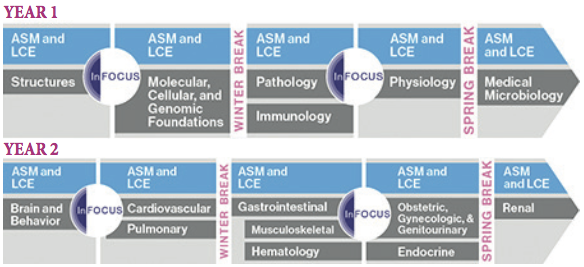By Andrew Kent (entering class of 2009)
Coinciding with the changes brought on by the establishment of the new Mount Sinai Health System, the recently renamed Icahn School of Medicine at Mount Sinai underwent a major overhaul of its MD curriculum. Healthcare is an ever changing field, and as such, the way we train doctors must constantly evolve as well. Medical training must prepare doctors for the changing medical landscape and complex health challenges that society faces today. I recently had the opportunity to meet with Dr. Reena Karani, Associated Dean for Undergraduate Medical Education and Curricular Affairs, to discuss the motivations behind the curriculum changes, what goals they were designed to achieve, and how the changes are expected to achieve them.
A dedicated team of faculty, staff, and students designed the new curriculum based on a philosophical vision of the role physicians ought to play in society. Should doctors simply provide a service for patients, or should they have a critical perspective on the very idea of health and wellness for humanity? Dr. Karani believes that doctors should not be passive distributors of medical practice, but should be agents of change, critical of the status quo, constantly searching for ways to improve healthcare and advance science. By reciting the Hippocratic Oath, medical students and doctors swear to a moral imperative of caring not just for individual patients, but also for the greater health of mankind. Modern doctors cannot ignore the intrinsic link between societal factors and individual health, thus the promise to do no harm implicitly necessitates an assessment of the shortcomings of healthcare delivery and the influence of the environment on an individual’s health As the bearers of medical knowledge and due to their intimate understanding of and involvement in medical practice, who better to attempt to identify and remedy the medical problems of society and of the medical system itself? Dr. Karani and the medical education team want to instill medical students with the necessary foundation of knowledge, and then teach students to go many steps further, to be critical of the knowledge they have gained, to identify its shortcomings, to search for better treatments and delivery methods. “We want,” she says, to train graduates “who are prepared to enter society as informed advocates and activists to advance clinical care and science, capable of promoting change; graduates who are going to be leaders in transforming healthcare and challenging the limits of science.” Given the exponential expansion of medical knowledge, the increasing complexity in medicine, and the shifting landscapes of healthcare delivery, graduates should also be willing “to accept ambiguity, question old paradigms, seek help, and collaborate and engage in the broader system-wide resources.” Dr. Karani wants the Icahn School of Medicine education to train students to be “nimble learners,” able to adapt and apply their skillset as medicine changes to stay at the frontier of any discipline as vehicles of progress.
The curriculum changes were designed to achieve this goal, of not simply teaching the essential core of knowledge, but devoting time to instill “habits of inquiry and practice.” The first two years of classwork still provide the core knowledge for clinical competency, but are supplemented with more small group and team-based learning opportunities to “encourage collective problem solving and peer teaching.” Furthermore, protected half days of “Flex Time” give students the time to pursue individual avenues of research and leadership, opening up the vast resources of the Mount Sinai Health System to their personalized edification and development. Year Three now consists of four 12-week modules through the main medical and surgical disciplines, and provides an expanded ten weeks of elective timetoallowstudentstoexplorespecialties particular to their career path. Fourth Year also consists of ample elective time, but now incorporates a specialty-specific skills-based course called Introduction to Internship which is designed to help graduating students hit the ground running in residency. Additionally, all four years now include “InFocus” weeks in which students are immersed in vital topics ranging from research methods and scientific innovation, to service learning, global health, human rights, advocacy, and leadership. Finally, based on the activities they focus on during their personalized experience, “Distinction in Research” or “Distinction in Medical Education,” highlighting their experience and commitment to their particular area of interest. Together these changes allow for a more personalized medical school experience, providing opportunities in and exposure to the diverse array of medical career paths, while instilling core values essential for progress and constructive change in medicine and medical research. Dr. Karani believes the uniquely talented and self-motivated students Icahn School of Medicine recruits allows for this open educational format to succeed, and regards the forward thinking Mount Sinai Health System as a “terroir” fit for their cultivation.
For more information about the Icahn School of Medicine core education, the opportunities available during the MD years, and about the guiding principles behind the curriculum, please visit the medical school’s curriculum website.

